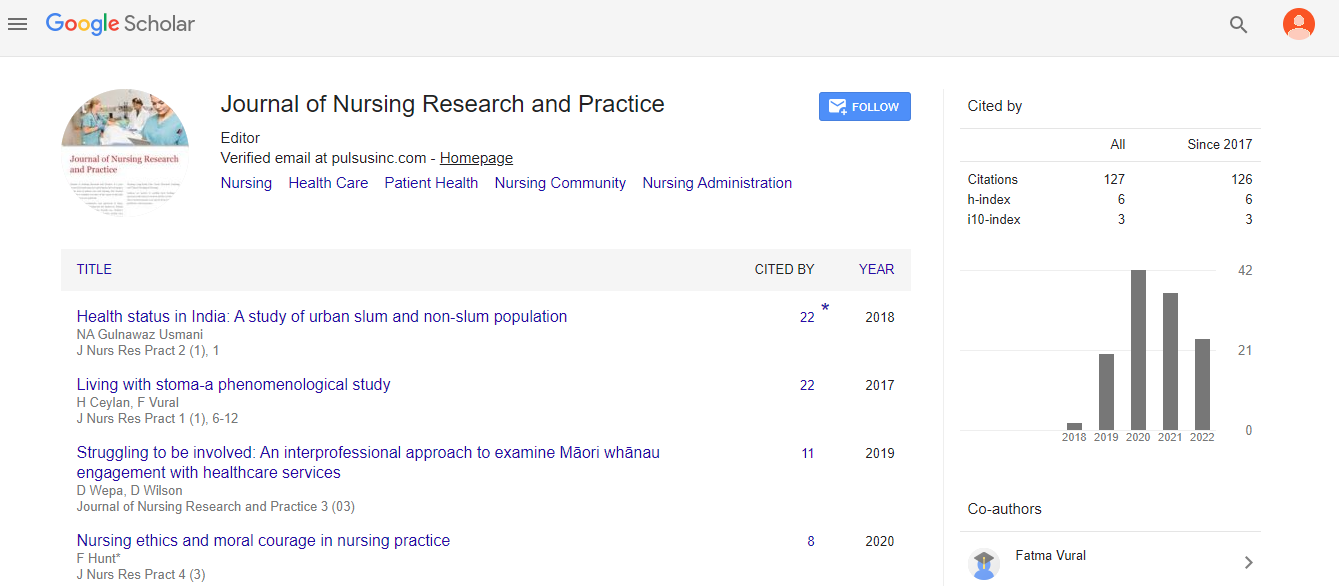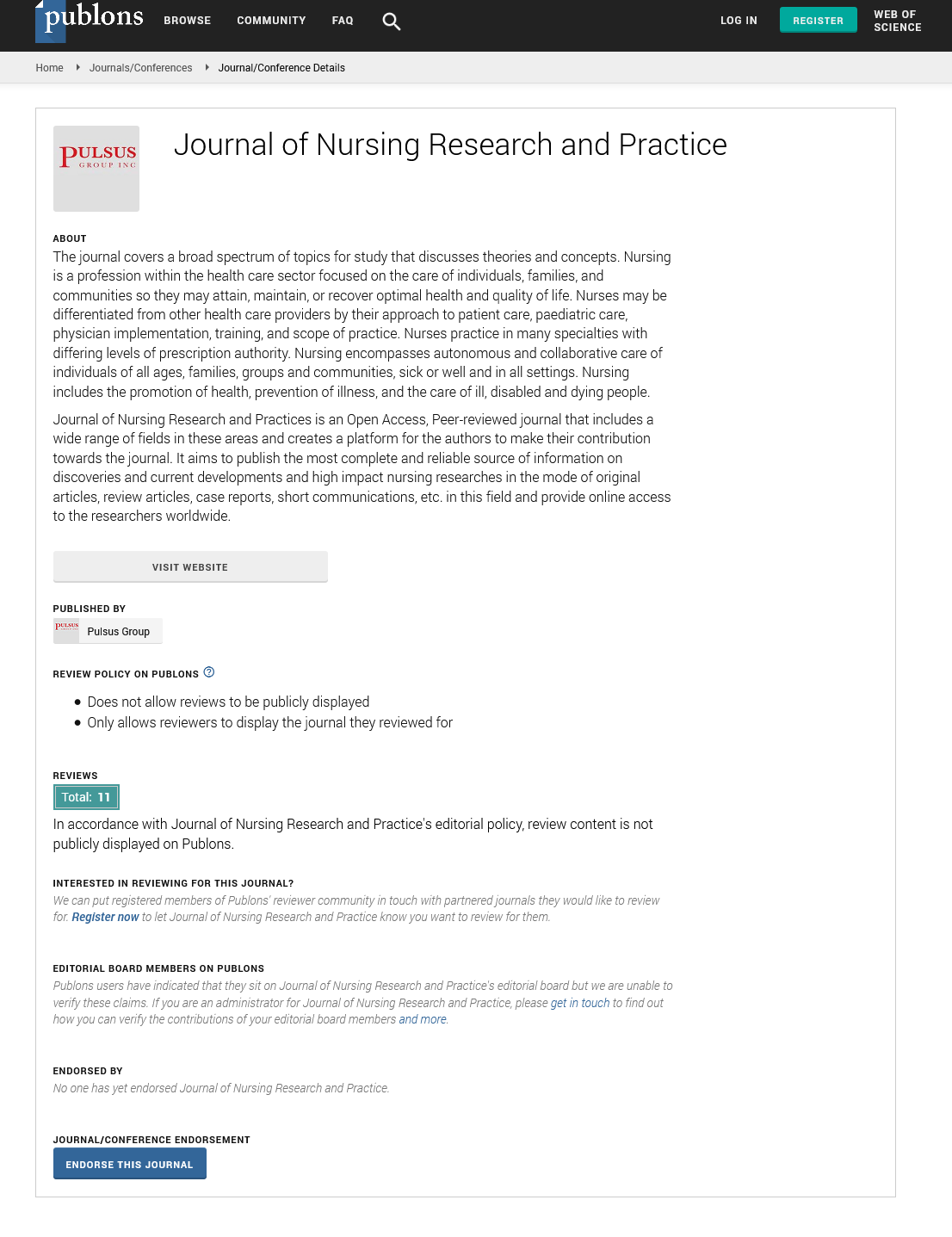The need for change in oncology care is humanization
Received: 02-Dec-2022, Manuscript No. PULJNRP-22-5871; Editor assigned: 04-Dec-2022, Pre QC No. PULJNRP-22-5871(PQ); Accepted Date: Dec 26, 2022; Reviewed: 17-Dec-2022 QC No. PULJNRP-22-5871(Q); Revised: 24-Dec-2022, Manuscript No. PULJNRP-22-5871(R); Published: 30-Dec-2022, DOI: DOI: 10.37532/ Puljnrp .22.6(12).188-189.
Citation: Pathak V. The need for change in oncology care is humanization. J Nurs Res Pract. 2022; 6(12):188-189.
This open-access article is distributed under the terms of the Creative Commons Attribution Non-Commercial License (CC BY-NC) (http://creativecommons.org/licenses/by-nc/4.0/), which permits reuse, distribution and reproduction of the article, provided that the original work is properly cited and the reuse is restricted to noncommercial purposes. For commercial reuse, contact reprints@pulsus.com
Abstract
Dehumanization of care is frequently brought on by advancements in cancer treatment, automation of care, time restriction, and fragmentation of the labour process due to institutional requirements. The emotional needs of patients, families, and healthcare personnel may have been put on the back burner despite the fact that it is undeniable that these treatments dramatically improved oncology outcomes. Therefore, providing care with a human touch can aid in reducing the anxiety that comes with receiving a cancer diagnosis and in enhancing patient outcomes. The increased patient expectations of recovery, accountability, control over their own health, contentment, safer care, patient happiness, and healthcare worker resilience those results from this compassionate and respectful approach to patient’s saves time and money. The humanization of care has developed in response to patients' and their families' concerns and requirements that go beyond their biological needs.
Key Words:
Cancer treatment, Dehumanization, Oncology results, Recovery expectations
INTRODUCTION
The application of enhanced diagnostic methods, therapeutic approaches, and rehabilitation technology has altered the fundamentals of medical practise and resulted in the automation, standardization, of healthcare. These initiatives unquestionably considerably improved oncology results, but they may also have contributed to the dehumanization and depersonalization of care, harmed the doctor-patient connection, and fostered mistrust among patients and caregivers. The conventional, paternalistic, illness-centered paradigm commonly used in healthcare systems has a propensity to see the patient as a "collection of symptoms" to be resolved rather than as a human being with unique needs and various perspectives on the disease process. Many healthcare systems now place a strong emphasis on the effectiveness and performance of their medical staff in order to provide more personalized, effective, safe, and high-quality care. Healthcare workers may become less human as a result of this institutional dynamic and fragmentation of care, which is a response to a system that prioritizes clinical outcomes over the needs of patients or even their careers. In order to understand the humanization of oncological healthcare, we set out to describe a few key difficulties
Humanistic care: what is it?
Humanistic medicine and healthcare are modern movements built on respect for the dignity, individuality, and uniqueness of the patient, taking into account their expectations and life experiences, as well as the other persons engaged in the care process. This method takes into account the bio psychosocial and spiritual aspects of the patient, the illness, and the treatment. It is not surprising that oncology services are marked by patients' feelings of powerlessness, tension, concern, and fear, especially if things go wrong. Oncologic disease and management can diminish functionality and control over their body, negatively affecting the patient's impression of dignity.
The significance of humanized care
The term cancer is one of the few that can be as strong or as drastically altering for a person and their family; it is unavoidably associated with the end of everything for many individuals. Simple deeds of compassion can, nevertheless, help diffuse bad feelings and minimize their suffering. However, clinical rules, the health system, and financial and institutional pressures could create a barrier between healthcare providers and the care they want to deliver. Many clinicians view the humanistic approach as a crucial component of providing cancer care. The biological paradigm, which encompasses education and oncology, places a strong emphasis on teaching physicians. However, emphasizing the significance of science in medical education risks unintentionally undermining the importance of humanism in recognizing the needs of patients and their families. In order to establish shared decision-making with patients and their carers, maintain the patient's perceived dignity, and enhance the doctor-patient connection, healthcare practitioners can benefit from the humanistic approach. As a result, humanized care can enhance the likelihood that patients will recover, adhere to treatment plans, be in charge of their own health, be more satisfied with care, be happier and resilient in their work, and be more cost-effective.
What hinders the application of humanism in oncology?
The feeling of insufficient time, fragmentation of the work process, rigorous work routines, heavy workload, excessive bureaucratic procedures, and financial and institutional pressures are some of the major obstacles to providing humanized care. Although this may occasionally be the case, for some patients a few minutes may be sufficient to demonstrate a sincere interest in their well-being and foster a sense of concern for the patient as a human being, increasing their trust in healthcare providers. For example, asking a patient how their weekend went can foster a sense of sincere concern for the patient as a human being. It might be an excellent place to start in removing these obstacles. Additionally, there is discomfort on a personal level since some healthcare workers may feel that this humanistic approach may be too taxing on their emotional coping mechanisms, leading to increased emotional tiredness and compassion fatigue, which are typical in these professionals. These life-changing experiences and emotionally charged interactions with patients may affect how we view life in general and how we handle our own situations. This privilege enables learning from patients beyond the biology level and even enables the observation that sometimes the humanistic elements of cancer care outweigh the scientific and can help the patient's suffering even more. Healthcare workers will have higher levels of job satisfaction, feel more confident, be able to reduce medical errors and improve patient outcomes, play a significant role in cost management, and experience higher levels of job satisfaction when organisations can get past these obstacles, establish suitable working conditions, and show that the well-being of healthcare workers is very important.
The humanistic car's keys
Respecting and maintaining the patient's human dignity is the cornerstone of the humanization of care. Additionally, effective communication between medical staff, patients, and caregivers is seen to be crucial for minimizing dehumanization. Although this idea is not widely accepted, many healthcare workers are more interested in learning how to offer information about healthcare or how to handle difficult circumstances when results are not what they expected than they are in getting to know the individual who is ill. Although many cancer patients initially hope for a cure or remission, healthcare professionals should always be honest with them about expected outcomes, therapeutic alternatives, and the side effects of any treatments. Healthcare professionals may avoid talking to their patients about poor prognoses for fear of crushing their hopes or causing depression, but the truth is that most patients want to hear the truth in sincere, carefully chosen words that convey a sense of honesty and empathy.It is important to reveal the truth in a timely, honest, and compassionate manner so that the patient can cope constructively with the pain, understand their prognosis, and may build a deeper and longer-lasting hope based on realistic expectations and their desires. Although telling the truth can initially trigger pain, depressive symptoms, and intense negative emotions about a cancer diagnosis, it does not mean that the patient loses hope. When we pay close attention to patients and their families, we can learn about their preferences and sentiments, show respect, foster trust, and learn what matters to them; Due to the institution's efficiency and productivity demands, the electronic medical record can also be time-consuming and distracting to patient care, giving the impression that the patient and doctor are not interested in each other's needs. Therefore, failing to listen carefully may result in the administration of unnecessary therapies and procedures as well as the rejection of fanciful notions of recovery, all of which increase both human and financial costs. The patient's health must come first, especially when a cure is impossible and medical treatments are ineffective. Although the disease itself can cause both physical and emotional agony, it is frequently the latter that overwhelms the sufferer and family. Thus, modest acts of kindness like letting the patient listen to music, read a book, share memories, or just offer a silent, completely empathic presence can lessen psychological anguish and restore the impression of dignity that has been damaged by the disease process. The argument that family involvement in the healthcare process can result in psychological trauma, anxiety in caregivers, and distractions in healthcare providers has led to the displacement of family involvement, even though studies are inconclusive and it has not been linked to unfavorable outcomes. However, it has been noted that it can result in some attitude changes, including a greater concern for topics like dignity and pain management. Giving families the chance to participate in the patient's recovery can be beneficial for everyone concerned since it can reduce emotional stress, increase family satisfaction, help with disease acceptance, and aid in the bereavement process.
CONCLUSION
The goal of humanization, a wide concept under constant growth, is to put patients and caregivers at the centre of healthcare. It encompasses multidisciplinary patient management features. There is proof that it can lower medical errors, enhance patient outcomes, shorten hospital stays, and play a significant cost-management role. Our firm belief is that humanized care, which is founded on deeds of kindness, is truly effective forms of treatment that may assist medical professionals resist the high pressures they face while also acting as a great restorative for those who are dealing with cancer.






